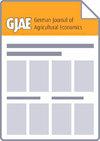德国关于生物燃料的公共辩论:谁在主导讨论?
IF 1.5
4区 经济学
Q4 AGRICULTURAL ECONOMICS & POLICY
引用次数: 10
摘要
根据欧盟委员会的“知识生物经济”(KBBE)概念,科学专业知识在政治决策过程中应具有重要意义。相比之下,对1995年至2012年期间德国生物燃料话语进行的印刷媒体分析只发现科学行动者在辩论中的边缘作用。尽管多年来,对生物燃料的支持一直被一些科学智囊团认为效率低下而予以拒绝,但德国政府和欧盟都坚持这一政策。这就提出了一个问题:驱动人们持续支持生物燃料的根本利益是什么?在这种背景下,这篇论文调查了公共媒体中不同角色的立场和定位,从而有助于更好地理解为什么尽管科学家们心存疑虑,但对生物燃料的政治支持仍在继续。该研究的一个核心发现表明,这种政治支持的一个原因可以从生物燃料倡导者联盟的主导地位中看出,该联盟主要由政治和经济参与者组成,在公共话语中。欧洲经济委员会(european paischen commission)在欧洲经济委员会(european paischen commission)的工作中,在欧洲经济委员会(european paischen commission)的工作中,在欧洲经济委员会的工作中,在欧洲政治委员会的工作中,在欧洲经济委员会的工作中,在欧洲经济委员会的工作中,在欧洲经济委员会的工作中,在欧洲经济委员会的工作中,在欧洲经济委员会的工作中。2012年12月1日,《德国生物科学与技术研究》杂志发表了一篇关于德国生物科学与技术研究的论文。因此,在德国,“生物技术”和“经验”都是低效的,“联邦地区”和“欧盟”都是低效的。在生物技术研究中,我们的研究对象是生物技术研究人员。在diesem zusamenhang untersucht der Artikel的立场和立场上,verschiteen的立场和立场上,verstandenes的立场和立场上,verstandenes的立场和立场上,verstandenes的立场和立场上,werum die biokraftstofpolitik的立场和立场上,werum die biokraftstofpolitik的立场和立场上,versenschaftlern的立场和立场上。在德国的研究中心,在德国的生物技术研究中心,在德国的生物技术研究中心,在德国的生物技术研究中心,在德国的生物技术研究中心,在德国的生物技术研究中心,在德国的生物技术研究中心。本文章由计算机程序翻译,如有差异,请以英文原文为准。
The Public Debate on Biofuels in Germany: Who Drives the Discourse?
Following the European Commission’s concept of a “Knowledge-based Bioeconomy” (KBBE), great significance in the process of political decision-making shall be attached to scientific expertise. In contrast, the conducted print media analysis on the German biofuel discourse for the period from 1995 to 2012 only found a marginal role of scientific actors in the debate. Even though support for biofuels has been largely rejected as inefficient by several scientific brain trusts for many years, the German government, as well as the EU adhere to this policy. This raises the question of the underlying interests that drive the persistent support for biofuels. In this context, the paper investigates the standing and positioning of different actors in the public media and thereby it contributes to a better understanding of why the political support for biofuels is continued, despite the doubts of scientists. One of the core findings of the study states, that one reason for this political support can be seen in the dominance of a coalition of biofuel advocates, mainly formed by political and economic actors, in the public discourse. Laut dem Konzept der Europaischen Kommission einer wissensbasierten Biookonomie soll dem wissenschaftlichen Expertenwissen eine bedeutende Rolle im politischen Entscheidungsprozess zukommen. Hingegen stellt die durchgefuhrte Printmedienanalyse des deutschen Biokraftstoffdiskurses von 1995 bis 2012 nur eine untergeordnete Rolle wissenschaftlicher Akteure in der Debatte fest. Obwohl weite Teile der Biokraftstoffforderung seit Jahren von wissenschaftlichen Expertengremien als ineffizient abgelehnt werden, halten die Bundesregierung und die EU an dieser Politik fest. Dies wirft die Frage auf, welche Interessen die anhaltende Forderung von Biokraftstoffen tatsachlich vorantreiben. In diesem Zusammenhang untersucht der Artikel das Standing und die Positionierung verschiedener Akteure in den offentlichen Medien und tragt damit zu einem besseren Verstandnis bei, warum die Biokraftstoffpolitik trotz der starken Kritik von Wissenschaftlern gefordert wird. Ein zentrales Ergebnis der Studie besagt, dass die Dominanz einer Koalition aus Biokraftstoffbefurwortern im offentlichen Diskurs, welche sich vor allem aus politischen und okonomischen Akteuren zusammensetzt, als ein Grund fur die politische Forderung von Biokraftstoffen anzusehen ist.
求助全文
通过发布文献求助,成功后即可免费获取论文全文。
去求助
来源期刊

German Journal of Agricultural Economics
AGRICULTURAL ECONOMICS & POLICY-
CiteScore
1.60
自引率
20.00%
发文量
0
期刊介绍:
The GJAE publishes a broad range of theoretical, applied and policy-related articles. It aims for a balanced coverage of economic issues within agricultural and food production, demand and trade, rural development, and sustainable and efficient resource use as well as specific German or European issues. The GJAE also welcomes review articles.
 求助内容:
求助内容: 应助结果提醒方式:
应助结果提醒方式:


